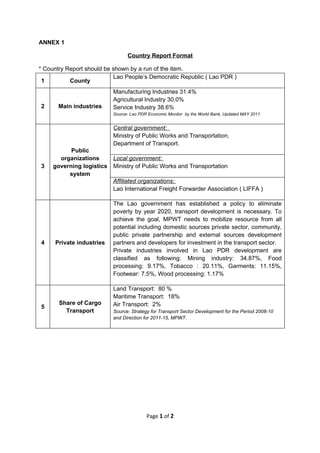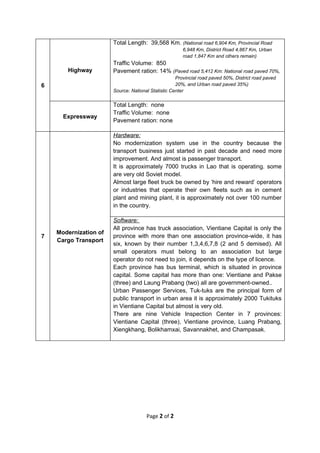Annex1 country report
- 1. ANNEX 1 Country Report Format * Country Report should be shown by a run of the item. Lao Peopleâs Democratic Republic ( Lao PDR ) 1 County Manufacturing Industries 31.4% Agricultural Industry 30.0% 2 Main industries Service Industry 38.6% Source: Lao PDR Economic Monitor by the World Bank, Updated MAY 2011 Central government: Ministry of Public Works and Transportation, Department of Transport. Public organizations Local government: 3 governing logistics Ministry of Public Works and Transportation system Affiliated organizations: Lao International Freight Forwarder Association ( LIFFA ) The Lao government has established a policy to eliminate poverty by year 2020, transport development is necessary. To achieve the goal, MPWT needs to mobilize resource from all potential including domestic sources private sector, community, public private partnership and external sources development 4 Private industries partners and developers for investment in the transport sector. Private industries involved in Lao PDR development are classified as following: Mining industry: 34.87%, Food processing: 9.17%, Tobacco : 20.11%, Garments: 11.15%, Footwear: 7.5%, Wood processing: 1.17% Land Transport: 80 % Maritime Transport: 18% Share of Cargo Air Transport: 2% 5 Transport Source: Strategy for Transport Sector Development for the Period 2008-10 and Direction for 2011-15, MPWT. Page 1 of 2
- 2. Total Length: 39,568 Km. (National road 6,904 Km, Provincial Road 6,948 Km, District Road 4,867 Km, Urban road 1,847 Km and others remain) Traffic Volume: 850 Highway Pavement ration: 14% (Paved road 5,412 Km: National road paved 70%, Provincial road paved 50%, District road paved 6 20%, and Urban road paved 35%) Source: National Statistic Center Total Length: none Traffic Volume: none Expressway Pavement ration: none Hardware: No modernization system use in the country because the transport business just started in past decade and need more improvement. And almost is passenger transport. It is approximately 7000 trucks in Lao that is operating. some are very old Soviet model. Almost large fleet truck be owned by âhire and rewardâ operators or industries that operate their own fleets such as in cement plant and mining plant, it is approximately not over 100 number in the country. Software: All province has truck association, Vientiane Capital is only the Modernization of 7 province with more than one association province-wide, it has Cargo Transport six, known by their number 1,3,4,6,7,8 (2 and 5 demised). All small operators must belong to an association but large operator do not need to join, it depends on the type of licence. Each province has bus terminal, which is situated in province capital. Some capital has more than one: Vientiane and Pakse (three) and Laung Prabang (two) all are government-owned.. Urban Passenger Services, Tuk-tuks are the principal form of public transport in urban area it is approximately 2000 Tukituks in Vientiane Capital but almost is very old. There are nine Vehicle Inspection Center in 7 provinces: Vientiane Capital (three), Vientiane province, Luang Prabang, Xiengkhang, Bolikhamxai, Savannakhet, and Champasak. Page 2 of 2


